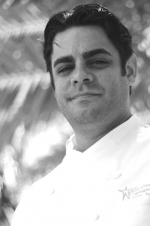Interview with Chef Jeffrey Brana of NORMAN’S – Coral Gables, FL
Joy Johnson: Why did you start cooking? What or who inspired you to become a chef?
Jeffrey Brana: I originally started to work in a restaurant to make money as a server. When the slow season arrived, I went into the back of the house. I ended up enjoying cooking more than going to school. My grandmother also influenced me. She is a phenomenal cook. I am lucky enough to have been raised in an era in which people sat down to dinner to have a family meal.
JJ: Did you attend culinary school? Would you recommend culinary school to aspiring chefs today?
JB: No, I attended the University of Florida. I don’t think culinary school is required, but I suggest it. I think a combination of school and hands-on experience is the key. I recommend a stagière as well.
JJ: In addition to Norman Van Aken, you’ve also worked with Scott Howard (who had previously worked with Norman). Would you say that these two chefs are your greatest influences, or are there others who have strongly influenced you?
JB: Marty Blitz at Mise en Place gave me my first job. My mentor would be Scott Howard from Fork in Tampa. He showed me all of the intangibles- how to hold a knife, how to skim stock, etc. I respected him then, and I respect what he does now.
JJ: Are there any secret ingredients or specialty purveyors that you especially like? Why?
JB: I like to use violet mustard and Japanese chili paste. We use a purveyor in Homestead called Tropical Delights Organic Farm. We have a longstanding relationship, and I visit
the farm seasonally. I can get locally grown sustainable agriculture such as specialty fruits, greens, and herbs unique to South Florida.
JJ: What is your most indispensable kitchen tool? Why?
JB: Chopsticks. They enable you to handle food delicately. I use them for all stages, from preparing to plating food.
JJ: What is your favorite question to ask during an interview for a potential new line cook?
JB: What are you reading right now? This gives me a sense of where they stand in cuisine. Even if it is not as advanced, it’s okay. I can tell a lot about them by asking this.
JJ: What tips would you offer young chefs just getting started?
JB: Remind yourself everyday to strive for excellence in every endeavor. This philosophy follows you into the kitchen, where your personal life follows as well.
JJ: What are your favorite cookbooks?
JB: Pellegrino Artusi- The Science of Cooking and the Art of Eating Well (La scienza in Cucina el' arte di Mangiar bene). It was published in 1891 and covers a broad scope of Italian cuisine. Artusi’s wit, his anecdotes on history and his two cents make it an interesting book.
JJ: What cities do you like for culinary travel?
JB: I like the San Francisco Bay area. Overseas is great too, but the west coast is unbelievable. There is a great attitude, concentrating on the basics of food and wine, including a wonderful diversity.
JJ: What are your favorite restaurants in Miami?
JB: Grazianos, an Argentinean steakhouse.
JJ: Where do you see yourself in 5 years? In 10 years?
JB: I see myself owning my own restaurant in the country. I want the ability to be at peace and let the restaurant speak for itself.






